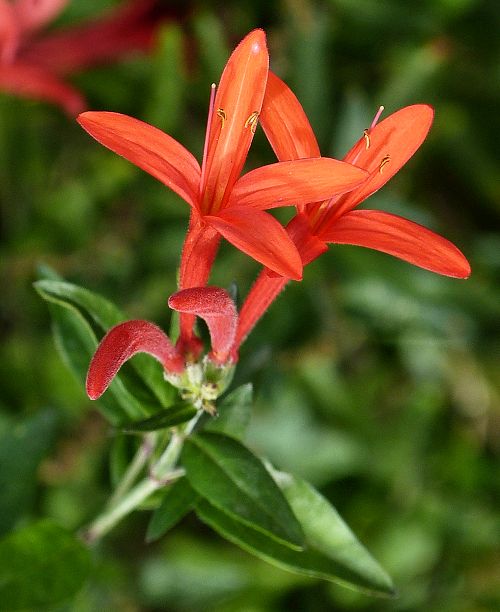Growing Anisacanthus quadrifidus var. wrightii:
Flame Acanthus
Description
Form: Shrub.
Leaf retention: Deciduous.
Growth rate: Slow to rapid, depending on water and soil compactness.
Mature Size: 3-5' (1-1.5m) high and wide.
Flowers: Orange to red, tubular, up to 2" (5cm) long, usually pointing upward, clustered on ends of main and lateral stems.
Bloom: Spring and fall with weekly irrigation. Once well established, it will bloom in October whether irrigated or not.
Fruit: Brown capsules with black seeds.
Leaves: Green, lance-shaped.
Stems: Ascending to upright.
Wildlife: The flowers attract hummingbirds and large butterflies. Elada and Arizona Checkerspot butterflies use Flame Acanthus as a caterpillar food plant. The foliage is browsed by rabbits, deer and other mammals.
Toxic / Danger: No.
Origin: Texas and Northern Mexico.
Form: Shrub.
Leaf retention: Deciduous.
Growth rate: Slow to rapid, depending on water and soil compactness.
Mature Size: 3-5' (1-1.5m) high and wide.
Flowers: Orange to red, tubular, up to 2" (5cm) long, usually pointing upward, clustered on ends of main and lateral stems.
Bloom: Spring and fall with weekly irrigation. Once well established, it will bloom in October whether irrigated or not.
Fruit: Brown capsules with black seeds.
Leaves: Green, lance-shaped.
Stems: Ascending to upright.
Wildlife: The flowers attract hummingbirds and large butterflies. Elada and Arizona Checkerspot butterflies use Flame Acanthus as a caterpillar food plant. The foliage is browsed by rabbits, deer and other mammals.
Toxic / Danger: No.
Origin: Texas and Northern Mexico.
Cultivation and Uses
USDA hardiness zones: 7b-11.
Heat tolerant: Yes.
Drought tolerant: Yes.
Sun: Full sun to light shade. More sun produces more blooms.
Soil: Well draining, pH 6.1-7.8 (slightly acidic to slightly alkaline). Compacted soil slows growth.
Water once established: Monthly for survival. This plant will need water once or twice a week to flower and attract butterflies and hummingbirds during the growing season.
Prune: In late winter, shear to encourage new growth. This plant can be pruned into a hedge.
Litter: Low.
Propagation: Seed or cuttings. It will reseed in favorable conditions.
Uses: Ornamental, wildlife attractor, low hedge.
USDA hardiness zones: 7b-11.
Heat tolerant: Yes.
Drought tolerant: Yes.
Sun: Full sun to light shade. More sun produces more blooms.
Soil: Well draining, pH 6.1-7.8 (slightly acidic to slightly alkaline). Compacted soil slows growth.
Water once established: Monthly for survival. This plant will need water once or twice a week to flower and attract butterflies and hummingbirds during the growing season.
Prune: In late winter, shear to encourage new growth. This plant can be pruned into a hedge.
Litter: Low.
Propagation: Seed or cuttings. It will reseed in favorable conditions.
Uses: Ornamental, wildlife attractor, low hedge.
Comments
This plant is a member of the Acanthus family (Acanthaceae). Other common names include Mexican Flame, Texas Firecracker, and Wright's Desert Honeysuckle. This shrub needs protection from browsing mammals. It is not a low-water plant if flowers are desired for more than one month. The butterfly in the photograph is a Cloudless Sulphur.
Do you have additional information or a different experience for these plants that you would like to share? Email info@GardenOracle.com. All contributions are welcome and appreciated.
This plant is a member of the Acanthus family (Acanthaceae). Other common names include Mexican Flame, Texas Firecracker, and Wright's Desert Honeysuckle. This shrub needs protection from browsing mammals. It is not a low-water plant if flowers are desired for more than one month. The butterfly in the photograph is a Cloudless Sulphur.
Do you have additional information or a different experience for these plants that you would like to share? Email info@GardenOracle.com. All contributions are welcome and appreciated.




Latest update: September, 2024
© 2008-2026 by GardenOracle.com

